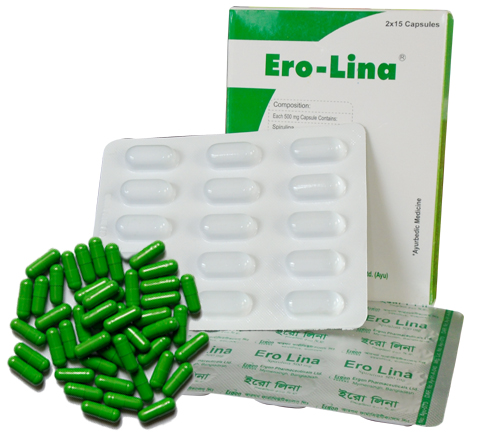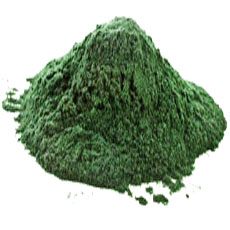
Description :
Spirulina is a genus of the phylum Cyanobacteria. Cyanobacteria are classified as either blue-green algae or as blue-green bacteria. Spirulina is a popular food supplement in Japan and is marketed as a nutritional supplement in the United States. It has been consumed for thousands of years by Mexican (Aztecs, Mayans), African, and Asian peoples. There are several species of spirulina. The ones most commonly used in nutritional supplements are Spirulina platensis (also called Arthrospira platensis) and Spirulina maxima. Spirulina is a rich source of protein. It also contains chlorophyll, carotenoids, minerals, gamma-linolenic acid (GLA) and some unique pigments. These pigments, called phycobilins, include phycocyanin and allophycocyanin. The pigments give spirulina their bluish tinge. Phycobilins are similar in structure to bile pigments such as bilirubin. In the spirulina cell, phycobilins are attached to proteins; the phycobilin-protein complex is called phycobiliprotein. Spirulina is considered a complete protein, because half of it consists of amino acids -- the building blocks of protein. It is also a rich source of other nutrients including B complex vitamins, beta-carotene, vitamin E, carotenoids, manganese, zinc, copper, iron, selenium, and gamma linolenic acid (an essential fatty acid). The iron level in spirulina is equivalent to that contained in beef. Because of its apparent ability to stimulate the immune system, spirulina may have antiviral and anticancer effects. Test tube and animal studies suggest that spirulina may also help protect harmful allergic reaction . Spirulina is considered a complete protein, because half of it consists of amino acids -- the building blocks of protein. It is also a rich source of other nutrients including B complex vitamins, beta-carotene, vitamin E, carotenoids, manganese, zinc, copper, iron, selenium, and gamma linolenic acid (an essential fatty acid). The iron level in spirulina is equivalent to that contained in beef. Because of its apparent ability to stimulate the immune system, spirulina may have antiviral and anticancer effects. Test tube and animal studies suggest that spirulina may also help protect harmful allergic reaction.Composition :
Each Capsule contains-Indications and Usage :
Spirulina has shown some indication of having antiviral effects in preliminary in vitro and animal studies. There is also evidence of a preliminary nature that it might favorably affect some immune functions and have some hepatoprotective capability. Hypocholesterolemic effects have been reported in some animal studies. Animal and test tube studies suggest that spirulina increases production of antibodies, cytokines (infection fighting proteins), and other cells that improve immunity and help ward off infection and chronic illnesses such as cancer. Spirulina promotes hematopoiesis (formation and development of red blood cells) and thus effective in anemia. This is thought to be due to the high levels of iron present in this food supplement. Animal and test tube studies suggest that spirulina may protect against allergic reactions by preventing the release of histamines and thus prevent allergy symptoms such as runny nose, watery eyes, hives, and soft-tissue swelling. Spirulina helps to maintain healthy skin and treats several skin disorders, such as eczema and psoriasis. Spirulina is also contained in some skin care products due to its moisturizing and tightening properties, and components derived from spirulina may have properties to help reduce inflammation, for example, arthritis. Studies have determined that spirulina is an effective source of dietary vitamin A. Spirulina can be used for general immune support and as an easily absorbed protein supplement in lack of appetite. It is also used in the treatment of Candida (yeastinfections) and hypoglycemia (low blood sugar). Amino acids make up 62% of spirulina. Because it is a rich source of protein and other nutrients, spirulina has been used traditionally as a nutritional supplement by people who cannot obtain sufficient calories or protein through diet alone and by those whose nutritional requirements are higher than normal, such as athletes. Although antibiotics destroy unwanted organisms in the body, they may also kill "good" bacteria called probiotics (such as Lactobacillus acidophilus) which sometimes results in diarrhea. In test tubes, spirulina has promoted the growth of L. acidophilus and other probiotics. Test tube studies suggest that spirulina has activity against herpes, influenza, cytomeglovirus, and human immunodeficiency virus (HIV).
Adverse effects :
Occasional gastrointestinal symptoms, such as nausea, have been reported. Also, there are a few reports of allergic reactions to spirulina-containing supplements.
Contraindications :
Spirulina is contraindicated in those who are hypersensitive to any component of a Spirulina-containing supplement.
Precaution :
Before taking spirulina pregnant or breast-feeding women should talk to the physician.
Dosage and administration :
Standard dosage of spirulina is 4 to 6 capsules (500 mg each) per day or as per the instruction of an appropriate health care provider.
Storage :
Keep out of reach of the children. Keep away from direct sunlight; store in a cool and dry place.
Specification :
Others information :
Spirulina Plant

Spirulina Extract

Functions :
1. Spirulina Is Extremely High in Many Nutrients-
Spirulina is an organism that grows in both fresh and salt water. It is a type of bacteria called cyanobacterium, which is often referred to as blue-green algae. Just like plants, cyanobacteria can produce energy out of sunlight, via the process called photosynthesis. Spirulina was consumed by the Aztecs back in the day, but became popular again when NASA proposed that it could be grown in space and used by astronauts (1). A standard daily dose of spirulina is 1-3 grams, but doses of up to 10 grams per day have been used effectively. It is actually quite amazing how nutritious it is. A single tablespoon (7 grams) of dried spirulina powder contains (2): > Protein : 4 grams. > Vitamin B1 (Thiamin) : 11% of the RDA. > Vitamin B2 (Riboflavin) : 15% of the RDA. > Vitamin B3 (Niacin) : 4% of the RDA. > Copper : 21% of the RDA. > Iron : 11% of the RDA.It also contains decent amounts of magnesium, potassium and manganese, and small amounts of almost every other nutrient that we need. This is coming with only 20 calories, and 1.7 grams of digestible carbohydrate. Gram for gram, this means that spirulina may literally be the single most nutritious food on the planet. A tablespoon of spirulina contains a small amount of fat (around 1 gram), including both omega-6 and omega-3 fatty acids in about a 1.5:1 ratio. The quality of the protein in spirulina is considered excellent, comparable to eggs. It contains all the essential amino acids that we need. It is often claimed that spirulina contains vitamin B12, but this is false. It contains pseudovitamin B12, which has not been shown to be effective in humans.
2. Spirulina Has Powerful Antioxidant and Anti-inflammatory Properties-
Oxidative damage can harm our DNA and cells. This damage can drive chronic inflammation, which contributes to cancer and other diseases. Spirulina is a fantastic source of antioxidants, which can protect against oxidative damage. The main active component is called phycocyanin. This antioxidant substance also gives spirulina its unique blue-green color. Phycocyanin can fight free radicals and inhibit production of inflammatory signalling molecules, providing impressive antioxidant and anti-inflammatory effects.3. Spirulina Can Lower LDL and Triglyceride Levels-
Heart disease is currently the world's biggest killer. It is known that many measurable factors, termed risk factors, are linked to an increased risk of heart disease. As it turns out, spirulina has been shown to have beneficial effects on many of them. For example, it can lower total cholesterol, LDL cholesterol and triglycerides, while raising HDL (the "good") cholesterol. In a study of 25 people with type 2 diabetes, 2 grams per day of spirulina significantly improved these markers. Another study in people with high cholesterol found that 1 gram of spirulina per day lowered triglycerides by 16.3% and LDL by 10.1%. Several other studies have shown favorable effects, but with higher doses of 4.5-8 grams of spirulina per day.4. Spirulina Protects LDL Cholesterol From Becoming Oxidized-
Fatty structures in the body are susceptible to oxidative damage. This is known as lipid peroxidation, which is known to be a key driver of many serious diseases. For example, one of the key steps in the pathway towards heart disease is LDL lipoproteins in the blood becoming oxidized. Interestingly, the antioxidants in spirulina appear to be particularly effective at reducing lipid peroxidation. This has been shown numerous times, in both human and animal studies. In a study of 37 individuals with type 2 diabetes, 8 grams of spirulina per day significantly reduced markers of oxidative damage. It also increased levels of antioxidant enzymes in the blood.5. Spirulina Appears to Have Anti-Cancer Properties, Especially Against Oral Cancer-
Some evidence suggests that spirulina can have anti-cancer properties. For example, some research in test animals shows that it can reduce cancer occurrence and tumor size. Spirulina has been particularly well studied with regard to oral cancer, which is cancer of the mouth. One study looked at the effects of spirulina on 87 people from India with precancerous lesions called OSMF in the mouth. After using 1 gram per day for 1 year, 45% of the spirulina group had a complete regression of lesions in the mouth, compared to only 7% in the control group. When they stopped taking the spirulina, almost half of the responders developed these lesions again the following year. In another study of 40 subjects with OSMF precancerous lesions, 1 gram of spirulina per day led to greater improvement in symptoms than the drug Pentoxyfilline.6. Studies Show That It May Reduce Blood Pressure-
High blood pressure is an important driver of many killer diseases. This includes heart attacks, strokes and chronic kidney disease. While 1 gram of spirulina is ineffective, a dose of 4.5 grams per day has been shown to reduce blood pressure in individuals with normal blood pressure levels. This is thought to be driven by an increased production of nitric oxide, a signalling molecule that helps the blood vessels relax and dilate.7. Spirulina Improves Symptoms of Allergic Rhinitis-
Allergic rhinitis is characterized by inflammation in the nasal airways. It is triggered by environmental allergens, such as pollen, animal hair or even wheat dust. Spirulina is a popular alternative treatment for symptoms of allergic rhinitis, and there is evidence that it can be effective. In one study of 127 people with allergic rhinitis, 2 grams per day dramatically reduced symptoms like nasal discharge, sneezing, nasal congestion and itching.8. Spirulina May Be Effective Against Anemia-
There are many different forms of anemia. The most common one is characterized by a reduction in hemoglobin or red blood cells in the blood. Anemia is fairly common in the elderly, leading to prolonged feelings of weakness and fatigue. In a study of 40 older people with a history of anemia, spirulina supplementation increased the hemoglobin content of red blood cells. Immune function also improved. However, this is just one study, and more research is needed before any recommendations can be made.9. Muscle Strength and Endurance May Improve-
Exercise-induced oxidative damage is a major contributor to muscle fatigue. Certain plant foods have antioxidant properties that can help athletes and physically active individuals minimize this damage. Spirulina appears to be beneficial, with some studies showing improved muscle strength and endurance. In two studies, spirulina was shown to enhance endurance, significantly increasing the time it took for people to become fatigued. Another study in college athletes found that spirulina supplementation increased muscle strength, but did not have any effect on endurance.10. Spirulina May Help With Blood Sugar Control-
Animal studies have shown that spirulina can significantly lower blood sugar levels. In some cases, it has outperformed popular diabetes drugs, including Metformin. There is also some evidence that spirulina can be effective in humans. In a study of 25 patients with type 2 diabetes, 2 grams of spirulina led to an impressive reduction in blood sugar levels. HbA1c, a marker for long-term blood sugar levels, decreased from 9% to 8%, which is substantial. Studies estimate that a 1% reduction in this marker can lower the risk of diabetes-related death by 21%. However, this study was small and only lasted for 2 months, so take this with a grain of salt.REFERENCE-
1) Journal of Ethnopharmacology, volume 90, Issue 01, January 2004, Page 39-43.
2) The American Journal of Chinese Medicin, Volume 36, Issue 06, 2008.


